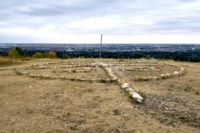Homeless shelter to provide road to recovery, SACPA hears
By Ry Clarke - Lethbridge Herald Local Journalism Initiative Reporter on March 3, 2023.
 Herald photo by Ry Clarke
Charles Weaselhead, Blood Tribe Department of Health board member, spoke to SACPA about the department's work since taking over the Lethbridge Shelter at the beginning of the year.
Herald photo by Ry Clarke
Charles Weaselhead, Blood Tribe Department of Health board member, spoke to SACPA about the department's work since taking over the Lethbridge Shelter at the beginning of the year.The Chancellor of the University of Lethbridge and member of the Blood Tribe’s department of health, believes the Lethbridge shelter, the Alpha House, may soon be able to offer more than just beds for the city’s homeless population.
During a session of the Southern Alberta Council on Public Affairs, Charles Weaselhead said he hopes to transform the shelter to become a road to recovery.
“Since Jan. 2 the Blood Tribe has taken over the operations, and I think it warrants a bit of information so that we are all on the same page,” said Weaselhead.
“What we are doing right now is going through incremental steps, to draw out some of the key strengths that we have as a unit. Right now the main focus is transitioning from a general shelter operation, to a more wellness type of operation with multiple units of wraparound services.”
Weaselhead pointed out that of the 220 to 250 homeless people in the city, about 70 per cent of them are Indigenous, and that concerns him.
“In my line of work that saddens me. That is such a burden for our Indigenous population, because not only are they over represented in the shelters, but they are over represented in the court system. They are over represented in unemployment, child welfare, and the list goes on.”
Looking to curb those numbers, the department of health will be looking at more ways to offer solutions to its cliental.
“Shelters, it is almost like a revolving door. They come in, they sleep, they go back out, they come back in, sleep, they go back out. Nothing really happens.
“The department of health, with our resources and mandate to care for our people, we are going to utilize the wraparound services that we have from our community, and hopefully from the city of Lethbridge. If we don’t take care of business, the opioid crisis to homelessness is going to overtake our young people, communities, and our cities.”
Exploring programs like detox, post-treatment, and community integration, the department of health will work with its clients to get them the help they need to get off the streets.
“We are also going to be working with wraparound services, providing mental health workers, case managers. “We have job skill programs, and life skill programs within our tribe. We will continue to provide resources and programming that will help them get back on their feet.”
With two-months under its belt running the shelter, Weaselhead noted the difference they are seeing already and how they hope to build on what the shelter can do.
“What we are trying to introduce is a human aspect to the shelter operation, and to homeless people. We have asked everybody to be patient with us. We have a one-year agreement, if things work out we will be able to go back to the province and rewrite the agreement for an additional year or so forth.”
14-13





I truly wish you great success in this concept that is not new to other centers, but will be better than what Alpha House shelter offered.
Although the issues end up on our streets in Lethbridge, many are caused by lifestyles on the First Nations communities in their homes. Change needs to begin in the homes of these communities and when this happens your nation will become stronger and end high rates of addiction, proverty, violence and crime. It all begins in the home and taking responsibility.
Many on our streets are banned/scorned from your communities because you didn’t know how to deal with the issues and many of those on our streets often draw others from their homes in your communities to the streets here. Many of the 14-16 year olds who police ask the public to help locate in the media are on the streets . . . here. What do you think they are doing here? Drugs and being used for sex? Our streets, as you are aware, turn into killing fields for your young people and ways must be looked at to find out how to keep them in your communities.
You need to resolve many of the social issues in you communities. 10 or 20 years ago there were many good things happening on the Kainai reserve with jobs, youth sports activities and rodeos . . . in the last 5 years I have seen a huge reduction.
You lease much of your farmland out to non-indigenous to farm.Your young people could be farming your lands.
Any peoples/nations that have high rates of unemployment have high rates of addiction, domestic violence, poverty and violent crimes . . . everywhere you find high employment you see these negative high rates.
I do wish you great success in your efforts to bring change to the homeless shelter. You do have to realize that many on the streets who avoid the shelter don’t want change though . . . they are there to commit their crimes and live lawless . . . for them, rehabilitation requires some form of incarcation and distance from their gang.
When “helpful” souls provide food, shelter, clothing and other necessities that the majority work to obtain and do so for free AND repeatedly, what motivation is there for street people to “normalize” their behavior ? The pimps and parasites feed off these people and, with all due respect to Mr Weaselhead, it is not just a burden to your indigenous population, it is a burden to those of us upon whom they have been ” dumped” by your administration.
Please try and get council and other levels of government to see this before it is too late for all concerned. Stop enabling this abuse of Indigenous young people.and others.